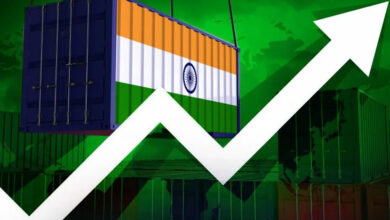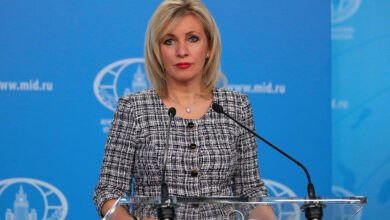China “doesn’t oppose” India at NSG, says Sushma Swaraj
New Delhi. As India enters the home stretch on last minute lobbying and negotiations to enter the Nuclear Suppliers Group (NSG), External Affairs Minister (EAM) Sushma Swaraj June 19 said China was “not opposed” to India’s entry to elite nuclear club.

China is only focused on procedure, to fix the “criteria” for entry of new members into the NSG, the EAM said in response to questions during her annual press conference in New Delhi.
A quietly optimistic Ms Swaraj said China, which has been leading the list of countries opposing India’s entry, is “not opposing India” but seeking procedural clarifications. It is opposed to an exception being made for India, Beijing has specified, and is batting to try and ensure that its close “all weather” ally Pakistan is also admitted.
“We hope to become a member of the NSG by year-end. China doesn’t oppose India’s membership, China is speaking about procedure,” Ms Swaraj said. She confirmed that Indian Foreign Secretary Dr Subrahmanyam Jaishankar had visited Beijing (on June 16 and 17) for bilateral talks during which “all issues including NSG membership” were discussed.
“We will succeed in convincing China too,” Ms Swaraj said.
About Pakistan’s bid to also enter to the NSG, the EAM said the applications should be considered on merit.
“We wouldn’t like to oppose anyone’s entry to the nuclear club. But we would like every country’s application to be considered on merit.”
Asked if India intended to block Pakistan’s entry, Ms Swaraj said, “We are not even a part of the NSG yet. There is no question of opposing anyone.”
India is particularly pushing for entry into the NSG to advance the cause of climate change, the EAM said. With its burgeoning power needs for development, India is committed to procuring 40 per cent of its power requirements from non-fossil fuels, of which nuclear energy will play a substantial part.
China is leading a group of around six nations (which also includes Turkey, Austria, Kazakhstan, New Zealand and South Africa) holding out against India’s membership to the 48-nation club that oversees global trade in advanced nuclear material and technology.
Ms Swaraj said she had personally spoken to 23 nations about India’s membership to NSG, of which 21 had no problems, while the remaining two had some questions, which had been addressed.
“I see a consensus happening,” the External Affairs Minister said, expressing hope that India would succeed in its bid.
The 48-member NSG functions on the basis of a consensus. India does already enjoy most of the benefits of NSG membership under a September 2008 exemption to the NSG rules, given to allow conclusion of the landmark civil nuclear deal with the US, despite India having developed nuclear weapons and never having signed the nuclear Non-Proliferation Treaty (NPT); the primary global arms proliferation control pact.
India seeks full entry, “because sitting in the room” is more effective than being “kept out of the room,” which is what the waiver still means. “India has not only fulfilled, but has gone beyond all the commitments we gave in 2008. So we are asking countries not to look at criteria, but at our impeccable credentials,” Ms Swaraj said.
‘Neighbourhood First’
Stressing that the diplomatic push for entry into the NSG had not hurt the ‘Neighbourhood First’ policy of the government, the Minister said she had visited every SAARC country and Prime Minister Narendra Modi has visited all but the Maldives and was very focused on the neighbourhood.
Speaking about Indo-Pak relations, Ms Swaraj said: “India-Pakistan relations were complicated “jatil” and outlined the government’s clearly defined three-point policy on Pakistan, which was; that India was ready to speak on all issues with Pakistan; India would only speak on all issues with Pakistan bilaterally (hence no third entities like the Hurriyat were allowed) and, “talks and terrorism cannot go together.” India, she said, remained firm in its resolve that talks and terrorism cannot go together.
She said there was “sehejta” (simplicity) in the chemistry involving Prime Ministers Narendra Modi of India and Nawaz Sharif of Pakistan.
“This warmth and simplicity in relations between two Prime Ministers were never there in the past,” she said.
On recent threats to Hindus in Bangladesh, she said the Sheikh Hasina government had been taking adequate steps and had so far arrested as many as 3,000 suspects.
“More than that, I feel happy to say that even Islamic leaders in Bangladesh have issued ‘fatwas’ and condemned such threats to Hindus in that country as un-Islamic,” she said. She also outlined that the government’s policy was that refugees “from all persecuted minorities,” whether Hindu, Sikh, Buddhist or Jain, from neighbouring countries would be given refuge in India.
Close US ties
Ties with the US are probably at their closest today, she said, expressing happiness that the US had designated India as a major defence partner. Pursuing these close ties and commitment to expand all facets of the friendship, however, the government would not compromise on issues of national interest, whether it was with Pakistan or with perceived closeness to the United States.
“Our close relations and defence ties with the US would not be at the cost of old friends like Russia,” she said, adding that ties with Washington were perhaps at their best level ever. She also confirmed, in response to a question, that “Japan will be a permanent part of the Malabar exercises,” along with the US and India. Earlier, it would intermittently take part in the annual exercises.
Answering a question on the South China Sea and whether India and the US had deliberately left out mention of the issue during the PM’s recent visit, she said, “all issues should be resolved peacefully,” through internationally recognised legislation. “If necessary, they should use UNCLOS” (United Nations Convention on Law of the Seas).
Terrorism
On the issue of terrorism, Ms Swaraj said the government had brought the CCIT (Comprehensive Convention on International Terrorism), which India had introduced in the United Nations in 1996 “out of cold storage” and was hopeful that New Delhi would manage to get the CCIT adopted by the year end.
“That is why,” she said, “the Prime Minister has visited so many countries in West Asia and reiterated that there can be no good terrorist and no bad terrorist. All terrorism is a crime against humanity,” she said, adding that even Saudi Arabia had agreed with the Prime Minister’s definition of terrorism.
The EAM defended the government’s global outreach-driven foreign policy and outlined the many benefits of such endeavours, while stating that it was their endeavour to ensure that a high level, ministerial representative of the government (if not the PM or her) visit at least 200 countries by the end of 2016.
“Foreign Direct Investment (FDI) does not come sitting at home,” Ms Swaraj said. “As much as $55 billion or Rs 369,000 crore has come through the FDI route in the last two years. It is about a 43 per cent jump over what it was during the UPA rule,” she observed.
“Today when India speaks, the world listens,” she said, as a result of the government’s policies and outreach.





